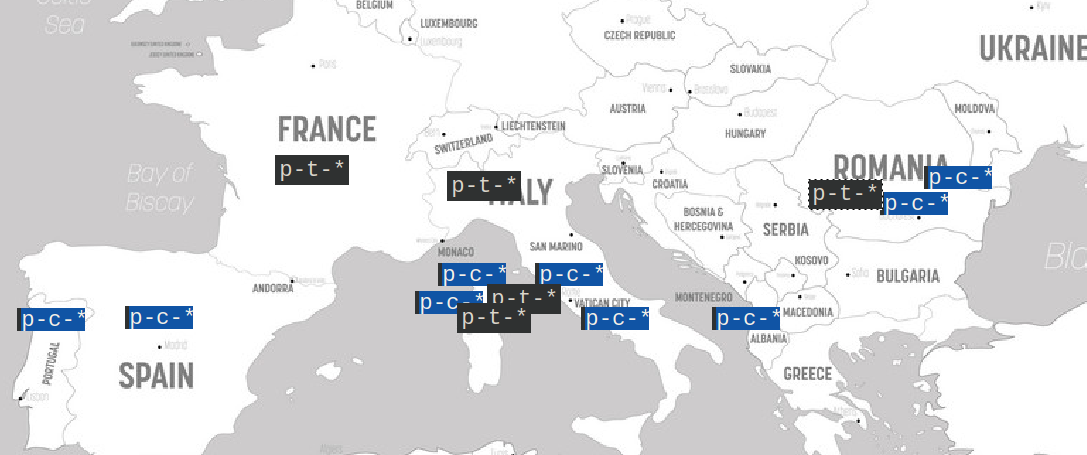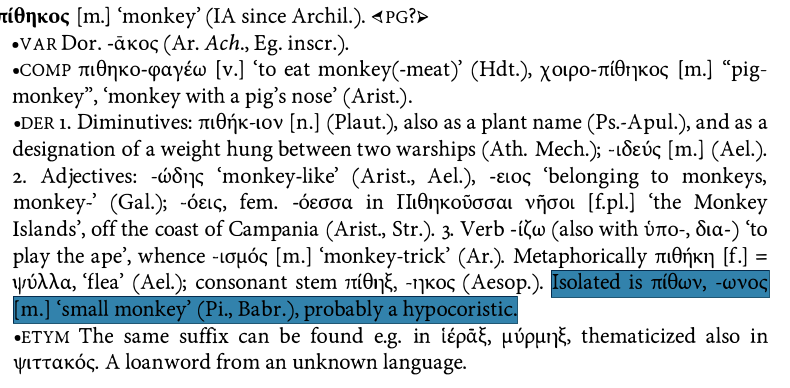Based on what I have read in order to answer a different question (namely Is the word "pitikkus" (meaning small) attested in Vulgar (or other) Latin?) I have come to the conclusion that no matter the answer to this one, it has become a bit otiose: that term (even if attested in other sources than the occurence in Procopius) is not a Greek word.
The fact that the Greek word meaning "monkey" has been used once (and not much more than that) with the meaning "dwarf" was most probably based on a temporary contamination that is not recorded in the dictionaries.
Both questions are related to the same type of Wiktionary page. Looking more into it I had the occasion to reevaluate my trust in such internet sources. Often information is confusing, the links are wrong.
The bad page is this, on pitic:
Unknown. Possibly from piti (“to hide”). Or related to Greek πίθηκος
(píthikos, “monkey”), cf. Proto-Slavic *pitikъ. See also Vulgar Latin
*pitikkus (“small”). Compare Sardinian pitticcu (“small”) and Basque pitika (“kid”).
Almost everything is wrong there:
"pitic" means dwarf, small, and imagining it comes from a verb "to hide" (to make oneself small) may seem to make sense. But the link sends to nothing related to Romanian and is anyway misleading: Romanian dictionaries either circularly reconstruct the verb "a piti" from the word "pitic" or assign to it an unknown origin.
the Greek and the Slavic connections are both misleading: that Old-Slavic term has the same form and meaning as the Greek one and is obviously based on it (as confirmed by Franz Miklosich - Etymologisches Wörterbuch der slavischen Sprachen 1886, p. 248) - which led me to the question above. It is on the other hand incredible for a word absent in all modern Slavic languages to be present in Romanian with a different meaning and for that Romanian word to share both meaning and morphology with many Neolatin words without being related to them etymologically.
as for the rest of the information it's even worse: the first two links lead to yet absent pages, the Basque one leads to a Swahili word: moreover, there is no pitikkus in reconstructed Latin, although it may be a "pitticus".
The real situation is this:
Lat. pitinnus and pitulus are doublets of pisinnus, meaning small, little boy or little girl (Dictionnaire etymologique de la langue latine Meillet-Ernout, first ed. 1935, 2001, p 510). Dictionnaire latin - francais by Gaffiot 1936 says marmot, bambin. Oxford Latin Dictionary 1968 says: pisinnus -a -urn, a. [perh. infantile wd.]
Tiny, little; (masc. as sb.) a little child.
These are Vulgar Latin words, absent in a dictionary like Etymological Dictionary of Latin and the Other Italic Langs by M. de Vaan Brill 2008. In Vulgar Latin 2000, by Herman, Jâozsef, page 101, we can read that
"the word for “small,” paruus, was replaced everywhere by words
that seem really to come from the nursery, such as pitinnus,
pisinnus, putillus(teeny)"
There is in Sardinian pithinnu (we find in Corominas, J. & Pascual, J.A, Diccionario crítico etimológico castellano e hispánico, Editorial Gredos, Madrid, 1987, p. 484, under PEQUEÑO) if not even piticu, a Milanese pitin, along with the French petit.
On the other hand: In Calabrese there is picca "small piece," in Romanian pici (small boy) and pic ("a drop, a small piece"), in Italian piccolo and piccino, in Sardinian piccinu, picciocu, all meaning "small".
These words led to (Vulgar) Latin reconstructions;
pittus > pittitus, pittinus, pitticus
piccus > piccinus, piccoccus, picculus
(The above can be read at page 33 of The Reduplication of Consonants in Vulgar Latin by Albert J. Carnoy, Modern Philology , Jul., 1917, Vol. 15, No. 3 (Jul., 1917), pp. 159-180, accessible online at this link.)
One can see that the Latin words of the form p-t-* and p-s-* have resulted in:
- a
p-c-* form in Italian area (piccino, piccolo, Sardinian piccinu, picciocu), Iberic area (Spanish pequeño; pequeno in Portuguese), Albanian (derivatives of picë) and Romanian (pici, small boy, "pic", a bit, a drop)
and
- a
p-t-* form in French (petit and related), Italian area (Milanese: pitinu, Sardinian: pithinnu, piticu) and Romanian (pitic)
And the two forms are not specific to Western or Eastern Romance nor otherwise geographically separated:

I think this is overwhelming proof that the origin of the Romanian word pitic cannot be found outside the area of Romance languages.
The same proof pleads heavily in favor of the idea that the use of pithekos with the meaning "small" or "dwarf" - even if that has happened more than once - cannot be explained except by a confusion with (contamination by) a similar-sounding word of late-Latin.
An article that I read after posting this answer shows that what I argue here is largely accepted in the recent research on the matter: Przemysław Dębowiak, “Contribution à l’étymologie des adjectifs romans signifiant ‘petit’ - online here. That also shows that some Wictionary pages are much better than the one discussed above: the scholarly article is linked as source of the page for puțin meaning "little" (quantitative: French peu, Ital. poco). The article of the Polish researcher includes many other related words, making a much more competent and developed argument in favor of what I have said.
Was there a Greek word somehow related to the Latin family mentioned above? --
Surely not, because nothing in relation to the Greek linguistic area appears in the discussion of these words (excepting that dubious Slavic-Greek connection for my Romanian word: which pleads against the quality of some internet sources as well as against many outdated etymologies given in Romanian academic (but non-etymological) dictionaries, because an authoritative and complete etymological dictionary of Romanian has not yet been published.)
Is there to be attested another use of the Greek word pithekos with the meaning "dwarf"?
-- Most probably not: doubts could be raised about that single occurrence in Procopius sooner than in favor of a second occurrence. (Not to mention simply that were a such occurrence to exist it would not have been absent in the dictionary that mentioned the first.)


